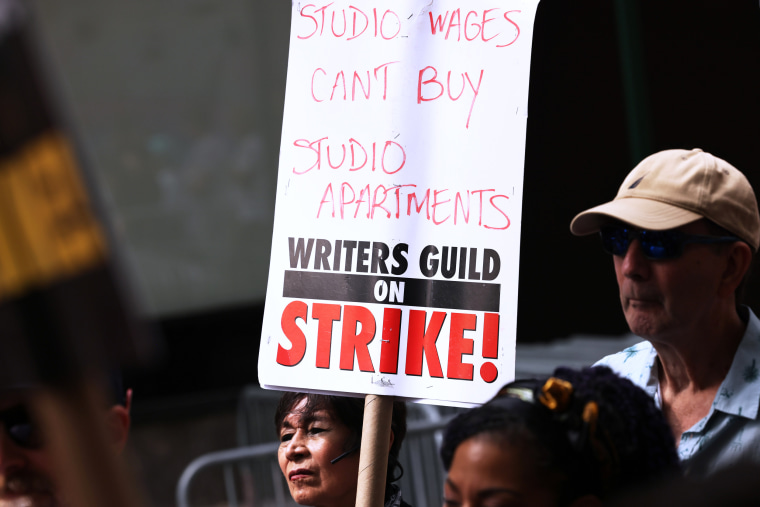The tentative agreement caps five straight days of negotiations, including the appearance on Thursday of Disney’s Bob Iger, Netflix’s Ted Sarandos, Warner Bros. Discovery’s David Zaslav and Comcast’s NBCUniversal Studio Group Chairman Donna Langley (NBC News is owned by Comcast), a source familiar with the discussions said.
Los Angeles Mayor Karen Bass is already banking on a much-needed conclusion for a city powered in part by entertainment.
“Now, we must focus on getting the entertainment industry, and all the small businesses that depend on it, back on their feet and stronger than ever before,” she said in a statement.
Hollywood actors will continue their strike, which started in July, until their union, SAG-AFTRA, reaches a deal with the studios, too.
SAG-AFTRA congratulated the writers Sunday night for having come to an agreement and wished the same for its actors, broadcast announcers and other members. “We remain on strike in our TV/Theatrical contract and continue to urge the studio and streamer CEOs and the AMPTP to return to the table and make the fair deal,” the organization said in a statement.
The writers and actors share similar demands, including higher base compensation, a bigger cut of project royalties (known as residuals) and stricter protections against the use of artificial intelligence.

The strikes have upended the film and television business, throwing thousands of people out of work and shutting down production on most scripted entertainment, from big-budget movies to late-night talk shows and streaming series. In interviews, writers, actors and behind-the-scenes crew members have described the financial hardships of the industry shutdown.
The studios say they have taken a hit, too. Warner Bros. Discovery, for example, said in a Securities and Exchange Commission filing this month that it assumes it will be “negatively impacted” by the dual strikes to the tune of up to $500 million.
The strikes come amid intense structural upheaval in Hollywood, which is grappling with how to embrace the digital era, survive the decline of traditional broadcast viewership and manage the rise of AI technologies, many of which have stoked anxiety about the future of all creative professions.
WGA members last went on strike in November 2007 amid an impasse with the studios over writers’ salaries and other issues. The work stoppage, which clogged Hollywood’s content production pipeline, lasted 100 days, ending on Feb. 12, 2008. The longest strike in WGA history was 154 days in 1988.